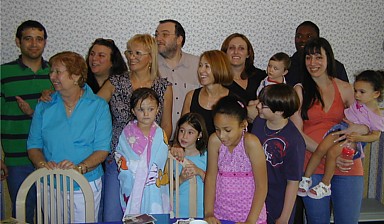Meeting the cousins
A couple weeks ago I wrote about my trip to Florida where I met a number of my cousins for the first time, and I promised I'd write about it some more. Here I make good on my promise.
These cousins are descended from my great grandfather's brother, who emigrated from southern Poland to Argentina a hundred years ago. He had meant to compare notes with my great grandfather, who came to the United States, and then they would both settle in whichever location turned out best. But they never reunited.
Last year I happened to make reference on this website to my cousin Natalia, who I wasn't even sure was my cousin at the time, and she found what I wrote and responded along the lines of: "Who are you, and why do you think we're related?" Her family had moved to Florida in the '90s -- not all that far from where other cousins of mine live.

I was in Florida for my cousin Josh's bar mitzvah. (He's the one in the dark blue T-shirt.) The above picture was taken at a brunch the day after the bar mitzvah, and as the party was winding down, everyone got out their cameras. In some respects this picture isn't the best, but I think it captures the chaos of the situation, where no one could agree on which camera to look at. I'm in the green shirt, looking at Josh's father, probably having just given him some advice on how to work my camera. There are too many people in the picture to gracefully identify them all, and I must admit I can't remember the names of Monica's and Maria's children.
